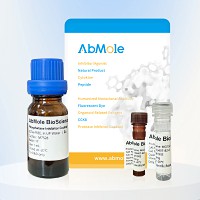All AbMole products are for research use only, cannot be used for human consumption.

Species: Mouse
Expression system: E.coli
Purity: > 95% as determined by reduced SDS-PAGE
Endotoxin: less than 0.001 ng/ug (0.01 EU/ug) as determined by LAL
Storage and stability: Lyophilized proteins should be stored at < -20°C but can be stored at room temperature for up to 3 weeks. The recombinant protein solution can be stored at 4-7℃ for 2-7 days. The isometric solution of the recombinant sample was stable at < -20°C for 3 months.
Bioactivity: Fibroblast growth factor 4(FGF-4) is a heparin-binding member of the FGF family. Human FGF4 cDNA encodes 206 amino acids (AA), including 33 signal sequences and 173 mature proteins, with a FGF homologous domain containing a heparin binding region near the C-terminal. The homology of mature human FGF4 with mouse, rat, dog and bovine FGF4 was 91%, 82%, 94% and 91%, respectively. Human FGF-4 has been shown to have cross-species activity. The expression of FGF-4 and its receptors, FGF R1c, 2C, 3C and 4, are spatio-temporal regulated during embryonic development. Fgf-4 is thought to play a physiologically relevant role in the self-renewal of human embryonic stem cells. It promotes stem cell proliferation, but may also aid differentiation depending on environment and concentration, and is often included in embryonic stem cell culture medium in vitro. In vitro, FGF-4 is a mitotic source of fibroblasts and endothelial cells and has the potential of autocrine transformation.
| Solubility (25°C) | It is not recommended to reconstitute to a concentration less than 100 μg/ml. |
| Storage |
Powder -20°C 3 years ; 4°C 2 years In solvent -80°C 6 months ; -20°C 1 month |
| Related Cytokines and Growth Factors Products |
|---|
| Recombinant Human GDF-15 Protein (HEK293 N-hFc)
Growth-differentiation factor 15 (GDF15), also known as MIC-1, is a secreted member of the transforming growth factor (TGF)-β superfamily. GDF-15 has a role in regulating inflammatory and apoptotic pathways in injured tissues and during disease processes. GDF-15 overexpression arising from an expanded erythroid compartment contributes to iron overload in thalassemia syndromes by inhibiting hepcidin expression. |
| Recombinant Human FGFR1 Protein (HEK293, C-His)
FGFR1, also known as CD331, is a full-length representative protein consists of an extracellular region, composed of three immunoglobulin-like domains, a single hydrophobic membrane-spanning segment and a cytoplasmic tyrosine kinase domain. |
| Recombinant Human FGFR2 Protein (HEK293, C-His)
FGFR2, also known as CD332, acts as cell-surface receptor for fibroblast growth factors and plays an essential role in the regulation of cell proliferation, differentiation, migration and apoptosis, and in the regulation of embryonic development. FGFR2 plays an essential role in the regulation of osteoblast differentiation, proliferation and apoptosis, and is required for normal skeleton development. It also promotes cell proliferation in keratinocytes and imature osteoblasts, but promotes apoptosis in differentiated osteoblasts. |
| Recombinant Mouse BMP-4 Protein (E. coli, C-His)
Bone Morphogenetic Protein-4 (BMP-4) is a critical signaling molecule required for the early differentiation of the embryo and establishing of a dorsal-ventral axis. BMP-4 is secreted from the dorsal portion of the notochord, and it acts in concert with sonic hedgehog to establish a dorsal-ventral axis for the differentiation of later structures. |
| Recombinant Human Coagulation Factor X (HEK293, C-Fc)
Coagulation factor X, belongs to the peptidase S1 family. Coagulation factor X is initially synthesized in the liver. Coagulation factor X is a vitamin K-dependent glycoprotein that converts prothrombin to thrombin in the presence of factor Va, calcium and phospholipid during blood clotting. |
All AbMole products are for research use only, cannot be used for human consumption or veterinary use. We do not provide products or services to individuals. Please comply with the intended use and do not use AbMole products for any other purpose.


Products are for research use only. Not for human use. We do not sell to patients.
© Copyright 2010-2024 AbMole BioScience. All Rights Reserved.
